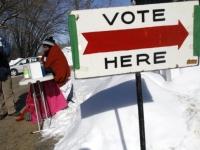BOB GARFIELD: The pundits and the media got it pretty much exactly wrong before the election, but before the confetti had hit the floor at the Scott Brown victory rally, they were at it again, looking for a meaning, a sign, a message in the election results.
MALE CORRESPONDENT: It’s a referendum on health care, sure and simple.
FEMALE CORRESPONDENT: - that they are fed up with Washington and that they are fed up with politicians.
FEMALE CORRESPONDENT: A surge of Massachusetts voters voicing frustration with the status quo.
FEMALE CORRESPONDENT: This is a referendum on the administration’s and Congress’s policies towards Wall Street.
BOB GARFIELD: From the pundits to the politicians, a search for answers out of Massachusetts. Here’s Speaker of the House Nancy Pelosi.
NANCY PELOSI: Heeding the particular concerns of the voters of Massachusetts last night, we heard, we will heed, we will move forward.
BOB GARFIELD: But just what did she hear, exactly? The fact is it’s very difficult to know what the Brown victory means because there are no data. There was very little polling during the race and, though a few polls before the election predicted the outcome, hardly anyone asked voters why they intended to vote the way they intended to vote. More importantly, there were no exit polls, meaning that all of those analyses about why the voters chose Scott Brown – was it health care, no, no, it was terrorism, it was Obama, no, no, it was Coakley – are nothing more than - guesses. President of the Pew Research Center, Andrew Kohut, is a man who doesn't leave home without a data set. He joins us, once again. Andy, welcome back.
ANDREW KOHUT: Happy to be with you.
BOB GARFIELD: No exit polls. Is it because it was such a foregone conclusion that it never occurred to anybody to try to gauge the mood of the voter leaving the polls?
ANDREW KOHUT: You know, exit polls are expensive and on races that are not thought to be races there will not be exit polls. That’s especially true with special elections. And who would have thought that Senator Kennedy’s seat would go to a Republican?
BOB GARFIELD: Not withstanding what you have just said, the usual suspects are busily now trying to interpret the outcome of the Massachusetts special election. Are they basing that on the same conventional wisdom that made them misread this election, to begin with?
ANDREW KOHUT: They're basing it on their own assumptions about what drove this election. And we often make assumptions about what people think, and they prove not to be the case when the numbers come in. I'll give you the classic example. When President Clinton was accused of having an affair with Monica Lewinsky, the assumption was that his approval ratings would go down. They didn't go down; they went up. And the polls back then changed the course of the way that issue played. There’s no changing the course of the way this issue is playing. The assumption is that this vote was a refutation of health care reform, a refutation of the policies and performance of Barack Obama. To some extent that may be the case, or that may be the case totally, but we don't know whether that is, and the extent to which other local factors of the appeal of these candidates were responsible for it. Undoubtedly, it’s some combination of these things.
BOB GARFIELD: Now, we've actually discussed this before with you on the program, but once these political narratives become accepted, once they stick they're notoriously difficult to unstick. Any guesses as to which particular piece of conventional wisdom that came from this race will be toughest to dislodge?
ANDREW KOHUT: I think what will be most difficult to dislodge, and I don't have any expectation that it will be dislodged anytime soon, if ever, is that this vote was a refutation of support for health care reform and a vote against Barack Obama. That could be true, but it also could not be true. The other thing I would add is that these things take on a life of their own. When these observations are made with such certainty and there’s no one saying, no, it’s not that, it’s something else and here’s why, they become charges that stick, and they themselves can affect public opinion. It wouldn't be shocking to me if the results of this election and the way they're being interpreted wouldn't have some effect on Barack Obama’s approval ratings.
BOB GARFIELD: Now that it’s been established that the conventional wisdom wasn't necessarily so wise, is your phone ringing off the hook with requests for polls elsewhere around the country to figure out what is motivating voters right now?
ANDREW KOHUT: Well, there’s a lot of interest in what is the impact of this event, given the way it’s interpreted. And it really has led to energizing politics in this town, and that means calling out the polls. So you’re going to see a lot of polls over the next two weeks. You know, they're not going to be in Massachusetts, they're going to be nationwide. And there will be a basis of saying well, things really have or have not changed with respect to health care reform or with respect to how the public looks at Barack Obama.
BOB GARFIELD: As always, thank you so much.
ANDREW KOHUT: Happy to do it.
BOB GARFIELD: Andrew Kohut is president of the Pew Research Center in Washington, D.C.
